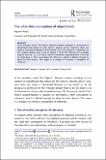| dc.contributor.author | Rayo, Agustín | |
| dc.date.accessioned | 2025-04-07T15:07:40Z | |
| dc.date.available | 2025-04-07T15:07:40Z | |
| dc.date.issued | 2025-03-02 | |
| dc.identifier.uri | https://hdl.handle.net/1721.1/159049 | |
| dc.description.abstract | In his excellent book Thin Objects, Øystein Linnebo develops a conception of
objecthood that allows for thin objects: objects whose ‘existence does not
make a substantial demand on the world’ (p. 4). His proposal is premised on
the Fregean dictum that to be an object is to be the referent of a possible
singular term (p. 22). As a result, much of Linnebo’s argumentation is focused
on defending a ‘thin’ conception of reference, which is liberal enough to
allow for thin objects. This paper is a critique of Linnebo’s conception of
reference. | en_US |
| dc.language.iso | en_US | |
| dc.publisher | Taylor & Francis | en_US |
| dc.relation.isversionof | https://doi.org/10.1080/0020174X.2025.2466700 | en_US |
| dc.rights | Creative Commons Attribution-NonCommercial-NoDerivatives | en_US |
| dc.rights.uri | https://creativecommons.org/licenses/by-nc-nd/4.0/ | en_US |
| dc.source | Taylor & Francis | en_US |
| dc.title | The ultra-thin conception of objecthood | en_US |
| dc.type | Article | en_US |
| dc.identifier.citation | Rayo, A. (2025). The ultra-thin conception of objecthood. Inquiry, 1–23. | en_US |
| dc.contributor.department | Massachusetts Institute of Technology. Department of Linguistics and Philosophy | en_US |
| dc.relation.journal | An Interdisciplinary Journal of Philosophy | en_US |
| dc.eprint.version | Final published version | en_US |
| dc.type.uri | http://purl.org/eprint/type/JournalArticle | en_US |
| eprint.status | http://purl.org/eprint/status/PeerReviewed | en_US |
| dspace.date.submission | 2025-04-07T14:57:53Z | |
| mit.license | PUBLISHER_CC | |
| mit.metadata.status | Authority Work and Publication Information Needed | en_US |
